I played the first 5 hours of Bioshock Infinite and now I have opinions
By cabelhigh 5 Comments
Listen, I go to college. My Xbox red-ringed two summers ago and I haven't had a chance to get another one. I style a Macbook Pro and spend most of my time on it looking at Steam games I can't run. I was already pumped for Bioshock: Infinite when it came out, but when the praise started rolling in it turned into a full-on frenzy. I needed it - but, alas, how could I get it? Look at me -- I’m a starving college kid with not enough time in the world to play the game even if I had the means to buy it (which I don’t, by the way). I was worried I'd have to wait until the summer (God forbid!) to get my hands on it, and that was just way too long.
So when I stumbled across an Xbox sitting in the second-floor lounge with Bioshock: Infinite already in the drive I chalked it up to divine intervention and played the damn thing. From midnight to 5 am I played it. Nonstop. No breaks. I was dead-set on powering through the whole game in one sitting but at around 4:30 my brain decided to shut down and I figured enough was enough. The next day the Xbox was gone, and withdrawal set in. I had the shivers, the shakes, the nightmares. I figured I'd write down my experience - maybe that'd help exercise the demons, I thought.
Without further ado: the first 5 hours straight of Bioshock Infinite! Unabridged.
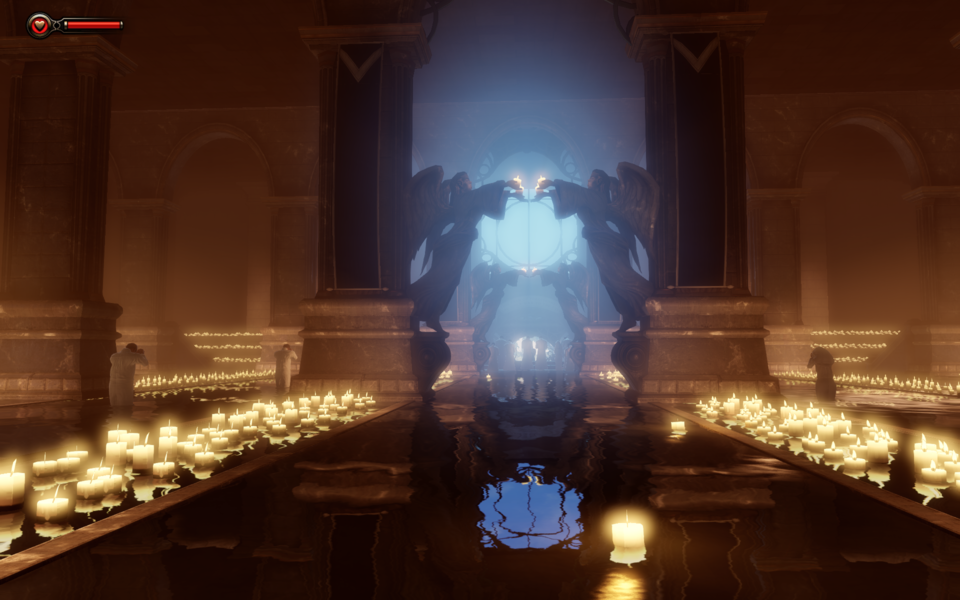
First off, don’t play Bioshock Infinite for 5 hours straight. I feel like this is a game that was made to be taken an hour or two at the time, to be sipped like a Earl Grey with a shot of Jameson. Why? Well, in these first few hours I can’t shake the feeling that both the world and the gunplay are constantly overwhelming, blasting my eyeballs with colorful, bloody stimuli -- and not always in a good way. There’s just so much going on, from the intimate details of the opening minutes to the blaze of gunfire from every direction that nips at your heels each time a fight pops off. These two elements -- the world and the combat, which I'll dive into individually later -- are fine on their own, but when you’re trying to contend with both at once, with sky-hooks and giant dirigibles and Big Daddie lookalikes and explosive Vigors and rocket launchers and American Exceptionalism, exhaustion quickly sets in. You're going to want to blast through this game, because the highs are so high, but listen to me: you need a break. Playing it straight with no breaks ended up leaving a bad taste in my mouth. Don't do it.
Second off, a quick recap of the story so far. You’re Booker DeWitt, some guy who’s sent to a lighthouse of the coast of Maine (where all games should start, really), who knows nothing about why he’s there other than the directive to retrieve a girl named Elizabeth so his ‘debt’ can be ‘payed.’ What ‘debt’ and who’s doing the ‘paying’ are kept a secret, probably for some fun third-act twist, but other than that the tale is relatively clear. In an inversion of the first Bioshock’s bathysphere trip to the bottom of the ocean, here Booker takes what can only be described as a sky-bathysphere to a city in the clouds, Columbia, an idyllic, racist commune obsessed with 1920’s-era nostalgia and the Battle of Wounded Knee (for whatever reason). They’ve imprisoned this girl, Elizabeth, in a giant tower the shape of an angel. That’s because, on top of everything else, they’re also religious fanatics, ruled by and following the word of a prophet named Comstock who seemed to really, really hate you, for a reason both myself and the esteemed Mr. DeWitt don’t understand (yet). And all this is told to you in the first thirty minutes. So, yeah. Like I said. “Overwhelming.”
But damn if being overwhelmed has ever felt this good. I spent the first hour or so (and many other times sprinkled along there) in slack-jawed awe at the world, the characters, the art, the sheer grandiosity of absolutely everything around you, the twisted stories suggested by the houses you scurry through and the backdoor hints of something darker at every turn. This game takes the sense of awe at entering an unknown, fully-realized city that was found in the first Bioshock and makes an entire living, breathing world out of it, one that is such a stupendous harmony of idealism, cultism, epicness, history, and surrealism that it is a true achievement for the medium (and any, for that medium). The feeling of stepping into the floating city of Columbia for the first time (which I definitely won't spoil for you, as it needs to be seen to be believed) is one of strongest emotional reactions I've ever had with a game, and gave me a high that lasted until the wee hours of the morning. I would love to slip on an Oculus and get lost in this world -- the details are so dense it practically feels designed for it.
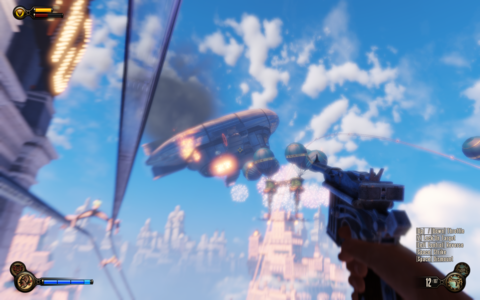
While this incredible feeling never entirely went away, the game squanders the potential of these early hours with shooting that feels like a step back from the first Bioshock. Now, I haven't played that game since it came out four years ago so I am no doubt seeing things here through rose-tinted spectacles, but I remember the Bioshock combat being in large, open areas, where experimentation was key and your wide array of powers were vital. Much has been made in previews of Infinite’s linearity, but I never really understood how severe it was until the shooting started. Every encounter that isn’t buoyed by the exhilarating sky-hooks (a device on your arm that lets you hop on rails and rollercoaster your way around some of the combat arenas) feels like a tight, one-way corridor, full of eagle-eyed enemies that will happily pick you off from impossible distances. On top of that, I can't tell you how many times I was getting shot from ten different directions and had no idea where any of them were coming from. Part of this problem is the game's color palette: while terrific in all other regards, the bullets trails that are so key to your survival tend to blend into the environment, and the combat clarity of the original’s yellow bullet trails against the greenish doom of Rapture is lost. The combat is also, ironically, too easy. While, yes, I'm dying a lot because I can't tell where I'm getting shot from and my aiming is like dragging a fork through molasses, I can still one-shot a normal enemy with a shotgun. This ultimately reduces the vast majority of enemies, already lacking the distinct powers and graphical flourishes that made the original’s Splicer’s so memorable, to little more than a nuisance, and makes the game surrounding them more a frustration than a challenge.
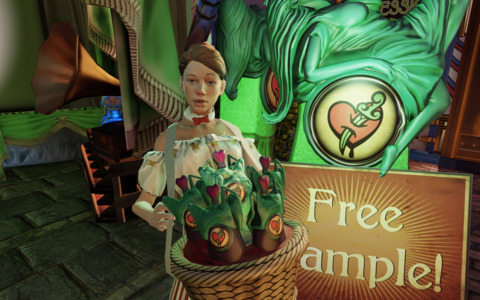
Compounding the lousy gunplay is one of Infinite’s biggest failures: the powers, which, at the point I'm at, are either useless or nearly identical. You start off with Possession, which does exactly what you think it does. Problem is, other than taking over turrets (it can also take over humans and vending machines, where you buy ammo and upgrade your weapons) it doesn't work. I've Possession-ed a few guys in my time, only for them to lend no support and them kill themselves, as one does. Other times, it doesn't work at all, with no indication why. On top of that, it takes up half your ‘Salts’ (read: magic) bar, which is way too expensive for a power that I could never get to work consistently and never offered a great tactical reason to exist.
The next one you get, Devil's Kiss, is the first offensive one, and truthfully I couldn’t care less about it. What's the point of using a fireball that consumes a huge amount of Salt when you can just shoot your enemies in the face? Sure, you can set a ‘fire trap’ with it, something you definitely can’t do with guns, but the combat is already so linear and incomprehensible that I never felt the need to engage in any power that emphasized careful planning over going in guns blazing. You may actually run out of ammo at some point and be forced to use your offensive powers, but later in the game there's always enough ammo lying around or being thrown to you (I’ll get to that in a second) so I found Devil’s Kiss to be entirely useless. The next three powers - Murder of Crows, Bucking Bronco, and Shock Jockey - all do the same thing: stun ‘em so you can shoot 'em more. Murder of Crows does look awesome, with dope crows coming out of your arms, but there's no need to use one of the stun powers instead of the other unless there's a story reason, which is very disappointing considering the variety and usefulness of the powers found in the first Bioshock.
Another disappointing aspect of the combat (do these ever end?) is the sky-hooks, which I earlier called, quote un quote, "exhilarating." And they are exhilarating -- when they work. The problem is that when you're riding on one the cursor that tells you when you can land or jump off and sever a baddie’s head from his torso is very finicky; I sometimes had to go back and forth three or four times just to get the cursor to show up under the perp's feet so I could trigger the kill, and it doesn't always show up when it should. The whole system, from its UI to its mechanics to its responsiveness, feels bizarrely unpolished for the polished world it exists in.
But never mind about the combat! Sure, it's a massive (too massive) and frequent (too frequent) part of the game, but, pah, that's not what you're here for, is it? You're here for the world, the story, the girl trapped in the tower! Ah, yes, Elizabeth. She’s been called by everyone and their grandmothers the great purveyor of the next generation of AI in video-games. Or something.
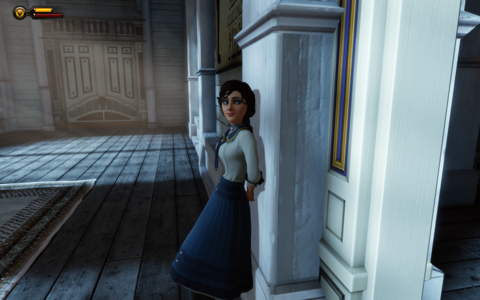
Full stop: Elizabeth is pretty awesome. Yes, she is (in the early goings, at least) basically a Disney princess, complete with Dreamworks-lite facial expressions and a love for Paris, but her and Booker's dialog is great and the way she aids you in combat is seamless and genuinely helpful. It seems pretty easy to form an emotional bond with her, something that, judging by the pre-release interviews, has been hinted at being important. Some of the best parts of the game so far have just been Booker and her walking around these amazing locals, commenting on stuff, soaking in the world, and saying 'huh.' Booker say 'huh' a lot, and I think it's perfect. I've seen people complain about that, but I felt if I was there that would be my exact reaction. Huh. This is weird and a little disturbing.
And, of course, the mystery around Elizabeth is so interesting - I want to learn more about that all the time, of why she was imprisoned, why you were sent to get her, and, of course, why she can open portals to other dimensions. It’s such a compelling forward thrust of a mystery, with all these bizarre and surreal components -- religious symbolism, with a heavy dash of quantum physics and a giant mechanical bird -- combining to create an intoxicating mixture. The question is, however, if the game can maintain that forward momentum so deftly established in the first few hours for the rest of its runtime. The part I'm at right now, a town run by an oft-mentioned entrepreneur named Fink, seems to be a detour in the story arc of the game, focusing less and less on those powerful mysteries mentioned above and more and more on side characters who seem to have little to do with...anything, at the moment. It reminds me of the post-Andrew-Ryan denouement in the first Bioshock, except now taking place within the first four hours instead of the last four. Perhaps every story needs a chance to catch its breath, but I can’t shake the feeling that we’ve barely even started and the game’s already fallen back on padding.
Anyway, let’s get back on track: Elizabeth. While she's great, she's nowhere near perfect, or even what was promised. First of all, she's not reactive like she was in that first gameplay demo with her, where she would play off you and what you were doing. Now, all of her comments are obviously scripted and only happen on things she's interacting with, not stuff you're looking at. If you let her go and head to another room, she’ll just talk to no one like a normal video game crazy person and then move to the next item of study. This is disappointing, considering how hyped those early interactions were, but the dialog's still good enough that it's not a huge deal. But all the good dialogue in the world can’t fix the fundamental problem that plagues the Booker/Elizabeth dynamic: their relationship is simply underwritten. In each dedicated scene of dialogue between the two of them there is a constant anxiety that seems to be poking at the script, urging it to skip the talking and get to the action. These scenes feel almost scared to give their characters room to breathe and grow, to allow them to share a quiet moment where nothing happens other than their own development and self-expression. By cutting corners like this, character motivations become muddy and character's intelligence become delegitimized: they agree on huge decisions without talking them through, act nonchalantly and chummy one scene and emotionally unhinged the next, reach for emotional depth far too quickly than would be believable, etc.
The game is also littered with the common problem of the characters acting irrationally in order to move the story forward, progressing an entire arc - an escape to Paris - by constantly undermining its characters with just-in-the-nick-of-time bad luck. For example, at one point after you rescue Elizabeth, she gets angry at you just as you find a ship that’ll get you out of the city. Just as you’re about to head out, she clubs you over the head with a wrench and throws you overboard, all for an emotional betrayal that rings hollow because for the past hour or she's been helpfully throwing you ammo and health without every voicing a shred of discontent. Another: when you rescue Elizabeth from the tower she agrees not only to go with you with barely a word of protest but also to actively help you. If a strange man loaded with weapons broke through your ceiling, pissed off the only creature you’ve ever had an emotional attachment to, and told you that he was going to rescue you by destroying everything you’ve ever known, would you follow his every word to the ‘t’? Sure, with the correct establishment of stakes, it would be easy to believe that Elizabeth would do anything, whatever the cost, to leave the tower; but in your brief time observing her (there are weird observation rooms where you watch her do stuff like paint and read and bend space-time) she doesn't exhibit a particularly strong desire to leave. The game certainly tells it to you this enough times, but by doing that it breaks the cardinal rule of storytelling: of showing, not telling. This, along with a few other emotional beats, felt very false to me.
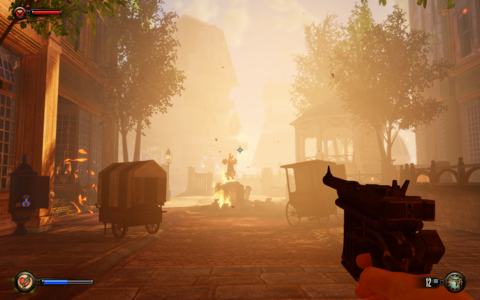
The only reason I'm making such a big deal about this is the rhetoric about how human Elizabeth feels, both by the PR and the reviews. Ken Levine, the creative director, seemed to think that her humanity and your empathy for her is a key component of the game, so when we fall into the same problems reconciling gameplay and story that narrative-driven games have been dealing with from the beginning, it's frustrating. While she is, yes, a step in the right direction, she is not the leap we hoped for.
Wow, you're probably saying right about now, you really don't like Bioshock Infinite. No. I like it. So far, it might even be a great game. I just think it fails in the ways it thinks are important in some very significant ways. Ways that, to be game it needs to be, it needed to nail.
So what does it nail? Pretty much everything I didn't say above. The world is a masterpiece. There's no way you can get around that. It's utterly packed with visually tremendous environments that ooze storytelling. The choice to set the (early goings, at least) game in a pre-fall dystopia is refreshing and even more important in really putting you in the place. You see the people, their lives, their families, their modes of living. It's not all bloody messages scrawled on walls and deformed addicts out for your Adam like the first Bioshock; it’s just a bunch of wealthy racists living in the clouds, which is somehow just as fascinating. You've got this God-fearing, idealist, Tomorrowland-esque society which has all the disturbed aspects of Rapture at the edges - the human experiments, the body-altering potions, the manufactured life - as a showcase to their power. Columbia is a truly prosperous society - at least, that's what it seems to their citizens. You begin looking in the nooks and crannies and you see pipes and pumps churning out manufactured happiness, the dirt and grime that accumulates in a spotless land. It's when the game begins peeling back the layers, showing that, no, this city is impeccable for a reason, that there may be darker things afoot in the areas they don't want you to go, that the barrier between virtual and real breaks down and Columbia becomes a brilliantly twisted take on Disneyland-esque Americana.
In that way, that makes it worth it. All the negative elements I talked about earlier; who cares? This is a place, a real place, and you are in it, exploring it, messing it up, destroying it. It's profound, and it's unlike anything, ever. I hope I can finish the game at some point - I'd like to see how it wraps up, and if the combat gets any better. If not, I can take comfort in how much this game has made me analyze and think. Hell, I just wrote a billion words about it. What other five hour descent into madness makes you do that?
